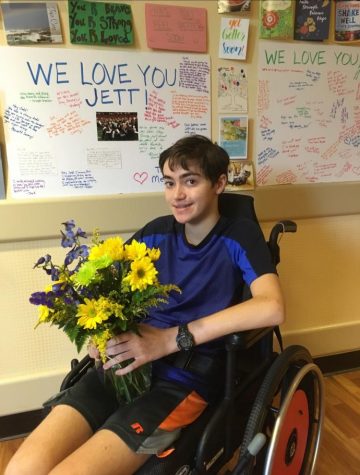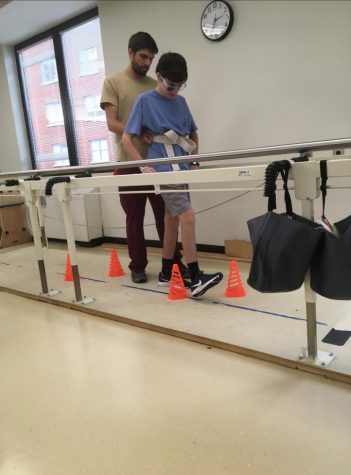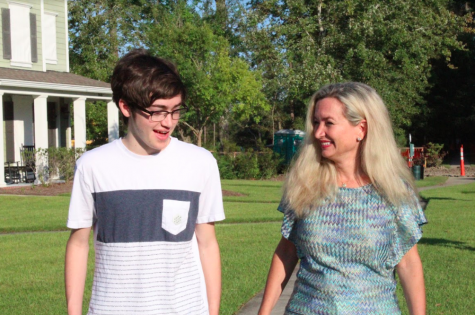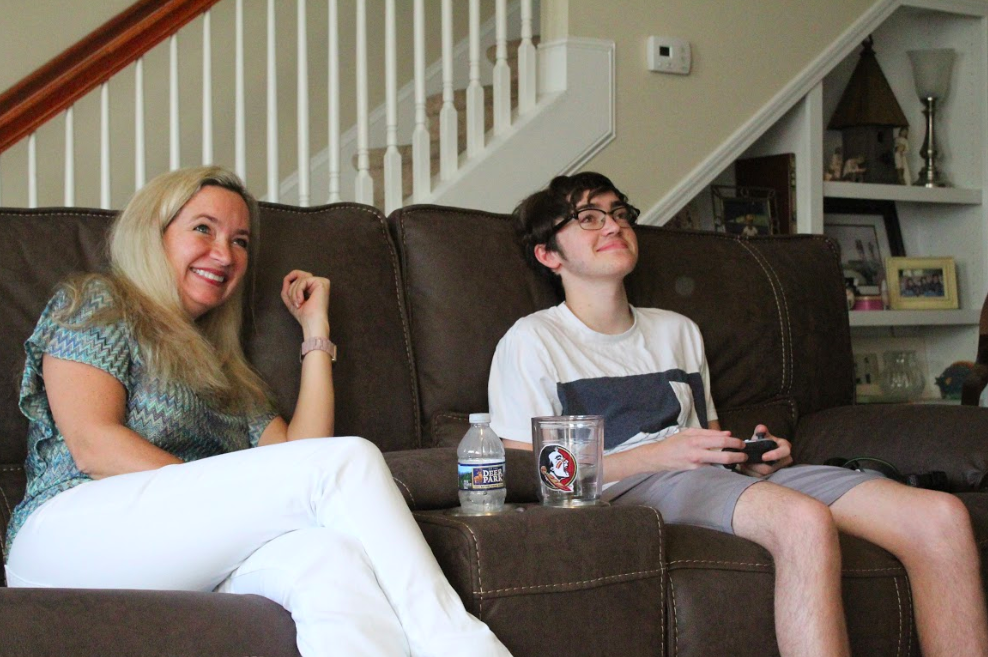Jett Goldberg: A high schooler’s journey through cancer
In June 2017, Jett Goldberg was diagnosed with a Pilocytic Astrocytoma, a brain tumor attached to his brain stem.
September 29, 2018
No matter how hard he tried, he could not move to get out of his bed. He tried again. He tried to lift up his head, but he was stuck in the same place.
He woke up and opened his eyes.
But it was not just a bad dream. It was not a nightmare.
This was real life.
The sound of hospital monitors played in the background like white noise. The hospital room was cold, but filled with posters and flowers from friends and family. His mom sat next to him. Her face was tired but still familiar.
Her face was the closest thing to home.
He tried again to move. He tried to stabilize his lower body, so he could use all his strength to sit up. He couldn’t.
This, his second surgery, had removed the whole tumor. He had been diagnosed in June 2017 with a Pilocytic Astrocytoma — a benign tumor often located near the cerebellum. The tumor was increasing pressure on his brain, making it hard to think, move, dance or do anything he once enjoyed.
He was a chorus student, hoping to join Show Choir his sophomore year. But things changed at the beginning of freshman year when he was feeling sick nearly every day.
“Freshman year, I used to have really bad headaches for like hours. I would throw up they would get so bad, but then be fine after… I thought they were just normal migraines,” he said.
He would tough it out through the day and just take an Advil when he got home.
One day, he sat in his algebra class and started to feel sick. His vision became blurry, he couldn’t see the problem. He became frustrated.
“I started just acting weird. I don’t even know what I did — I just was not like myself. I don’t really remember any of it, but Mrs. [Stephanie] McGuffin sent me to the clinic. I threw up halfway there,” Goldberg said.
Asked to sign in, he couldn’t guide the pen to the paper. He gripped the pen and tried his hardest to write his name. He ended up writing in the middle of the paper.
The nurse gave him some advil and sent him back to class.
“They thought it was just a bad headache,” Goldberg said.
When Jett went back to class, he knew something was wrong — this was more than just a bad headache. He tried to call his mother, Lani Huft, but couldn’t see the numbers on the screen. He gave the phone to McGuffin.
“Mom, I really don’t feel good,” Goldberg told his mother when she answered the phone.
“Ms. Huft, something is not right. You need to come to the school and come get him.” Huft heard her son’s teacher say.
This wasn’t Jett just wanting to come home.
Something was wrong.
A Problem Unsolved
He sat in the MUSC children’s emergency room for hours. What was the source of all this pain?
He waited and waited and waited.
The doctor came in.
“Probably just a migraine,“ he said.
“I kept thinking this isn’t just a migraine, my mom always get migraines… And I just knew whatever she had was way different than what I had,” Goldberg said.
Huft pressured the doctors for more of an answer, but they had none for them. Instead, they referred him to a migraine specialist to get an MRI, just to rule out a few things.
A week passed. He was looking forward to finding out if he made Show Choir for his sophomore year,.
“He had a great end of the year audition — he did everything perfectly and earned a spot in Show Choir as a sophomore, which is pretty rare,” Chorus Director Eric Wilkinson said.
He was spending his free time with his older brother, who would soon be going to college. Goldberg was busy being a normal kid.
But then an unfamiliar phone number kept calling Huft’s phone at her older son’s graduation party. Huft sent the caller to voicemail.
But then she listened to the voicemail. The caller was from MUSC.
“You need to come down to the hospital because we see something on the brain scan,” she heard on the recorded message.
Huft’s singing, dancing and happy son was sick.
“She was really sad, I had no idea anything was wrong, but she was talking quietly,” Goldberg said. “I could tell she didn’t want to tell me, so for five minutes, I kept asking her what was wrong.”
The color drained from his mother’s face. Her cracked voice said words that would haunt him for the rest of his life.
“You have a brain tumor,” Huft told her son.
Goldberg thought of sick patients in hospital beds. A bad headache? A blurry vision? That was a brain tumor?
Adjusting to words that will echo for an eternity
He tried to keep a positive outlook.
“I thought it was something that they could just take out and it would be over, but that’s not what ended up happening,” Goldberg said.
His mother was his safe haven. He looked to her for answers.
“So much was happening so fast …. the only thing I could think was that I needed to get Jett to the hospital and get the brain tumor out of him,” Huft said. “I just wanted it gone.”
Jett went from school halls and Tylenol to being confined to a hospital bed and feeding tubes. The doctors said he had to have two surgeries as soon as possible.
“They said he’d had [the tumor] for most of his life — the symptoms he was showing — was because it was a slow-growing tumor and the spinal fluid was just filling in his head,” Huft said. “It got to the point where it was too much.”
As soon as the news broke, friends became family — visiting Goldberg, watching after his brothers and being there for him and his family. Strangers in the community became friends.
While the gestures were nice, Huft only wanted one thing. She wanted her son to be healthy.
“When we first found out, a lot of his friends came down to hang out with him. We were trying to keep it as positive as possible… I was never afraid something terrible was happening,” Huft said. “I just wanted the brain tumor gone, so he could have his normal life back.”
However, nothing was normal about the hospital monitors attached to him. He was still not home.
A new environment
“A hospital isn’t a home,” Goldberg said.
Home was with his chorus family and with his kitten at his house. He had cards and posters all over his room to remind him of all the people who were thinking of him.

“I got probably 200-300 cards — half the people I didn’t even know — they were just my parents’ friends. I got five huge posters of me and my friends and it made things easier,” Goldberg said. “It reminded me of what life was like before [the tumor].”
In order to get back to his normal life, he needed to take the first step toward recovery: surgery. Three days after he had been diagnosed, he was in the hospital getting ready for his first one.
“With my first surgery, they were trying to be super conservative about it, so they didn’t take out the whole thing,” Goldberg said. “It was attached to my brain stem, so I barely could move. I was in a coma for a few weeks. I couldn’t talk or eat or move.”
Huft looked at her son. She’d remember the boy on the chorus stage to give her hope. When she looked at Jett, she looked at strength.
“I was next to him the whole time. Sleeping next to him, I never left his side, so when they came to get him to take him to surgery, I went with him up until after they put him to sleep…” Huft said. “Even after that, I asked them if I could still stay with him if I promised to stay still, but they said no.”
Huft sat in the waiting room, putting all of her energy into thinking about her son and how fast things had changed.
“He didn’t just have the brain tumor — we had the brain tumor. I was next to him the whole time,” Huft said.
She held his hand when he barely had the energy to lift a finger. She filled the room with conversation when it was silent. She was his cheerleader.
“I was a lot more dependent on my parents and my brothers and I was pretty independent before. I’ve always been a mama’s boy. Always,” Goldberg said. “But when I was in the hospital, she was always there next to me 24/7. So I grew a lot closer to her.”
However, the first surgery was just the beginning of the long road to recovery — including a second surgery that removed the rest of the tumor.
The second surgery took place five days after his first — on his mother’s birthday.
“People always ask me what I remember, but I don’t. My mom doesn’t tell me much about what it is about,” Goldberg said. “I was on a lot of drugs, I couldn’t move, it hurt to swallow because of the tube.”
The road to recovery
Once he gained enough strength, he was transported to the Shepherd Center in Atlanta that specializes in patients with brain injuries.
“At that point, I could barely move. I remember the ambulance driver hung up his phone so I could watch a movie on the way there,” Goldberg said. “That was really nice of him.”
Once he arrived at the center, he met people his age whose everyday life also were hospital beds and surgeries. That made things feel more normal.
“I was in a hospital bed for a few weeks. It’s super foggy. If I could remember it, I wouldn’t want to,” Goldberg said.
After the surgeries, Goldberg had to relearn everything.
“For the first month, I couldn’t think on my own,” Goldberg said.

The first thing he learned to do was swallow. For the past month, he had been on a feeding tube. There was only one thing on his mind.
Chick-fil-a.
The first day he could eat, he woke up to the white bag set up on his table, ready for him to eat.
“The whole time I was (at the hospital),I was always talking about Chick-fil-A because that is my favorite food of all time. When I passed the swallow test, Dr. Emerson ran over to the Chick fil a near the hospital and ordered an eight-count combo with a Dr. Pepper,” he said, “and by the time I got out of the room, she had it waiting for me on a table ready to go. That was so nice.”
Then, he learned how to sit up. The doctors carefully lifted up his body while his mother would say things like “you’re doing it baby, good job.” Tears would fall from her eyes.
“I had to grow up again really quickly. I was in a wheelchair until I had enough strength to just lift my arms above my head and when I was able to lift up my arms, I was so proud of myself because before — where I came from — I
couldn’t even move,” Goldberg said.
His mom was by his side, holding his hand and recording every moment as if it was his first.
“He had to relearn to do everything… Walk, talk, eat, sleep. I just wanted to make sure I was there through him having to learn everything again,” Huft said.
“Oct. 31st,” Goldberg said, smiling.
That was the day he got his somewhat normal life back. While most kids were trick or treating, he was walking down the hallway in his house thinking about every step and how lucky he was to take them.
“I’ll have a mental conversation with myself about where I came from and how far I’ve come,” he said.
He uses his experience to remind himself and others about perseverance and recovery.
“Anyone can do anything — it doesn’t matter how far down you go, you can always get back up,” Goldberg said. “That’s what I always think of.”
Everyone in Goldberg’s life learned something.
“It made me so humble. Things can happen in the blink of an eye. I take into consideration in my everyday life whether it be at my job or in a store if someone is being completely nasty,” Huft said. “They might be going through something. It gives you a different outlook when you see someone going through a hard time. It gives you so much more
compassion.”
Huft quit her job in order to help Jett. His siblings had to hold their family’s world together while it seemed like it was falling apart. Goldberg had to fight against his own body in order to take his life back.
His mother saw a sense of bravery in him.
“Jett’s super funny — he seems shy at first, but he’s super funny. He loves chorus, he loves music… He even performed at the Windjammer this summer,” Huft said. “He’s one of the bravest kids I know. He seems shy but he’s not.”
Goldberg now is back in the chorus family as he performs in Show Choir. For the first few weeks of his sophomore year, he only attended chorus.
“We made sure to keep giving him support. When he came back, we would help in the room like simple things, making sure he had a music stand, giving him practice tracks, he came back to chorus before he came back to any class,”
Wilkinson said. “He would come to chorus and go home.”
Wilkinson believes music was a big component of Goldberg’s recovery.
“Music was such an important aspect of his life,” he said. “I think it really helped him to let him come in and sing with a group of people and celebrate the week and celebrate our time together.”
Goldberg still goes back to the Shepherd Center to visit friends and help with charity events. While he still is recovering every day, Goldberg keeps a positive outlook.

“Recovery is getting past something that once held you back,” he said
June 5, 2016: he was sitting in a hospital bed.
June 7, 2017: he went to the Great Wall of China to celebrate his year of recovery.
“Physically, people are recovered after a few days, weeks or months,” Goldberg said, “but mentally we all are always recovering from something.”
